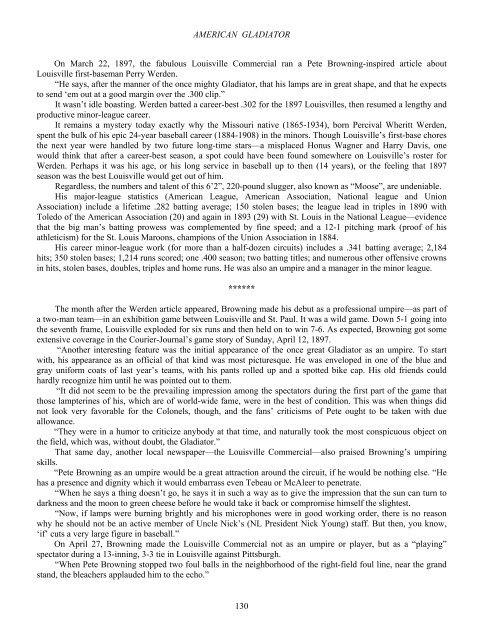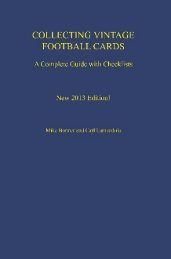AMERICAN GLADIATOR: The Life And Times Of ... - The Book Locker
AMERICAN GLADIATOR: The Life And Times Of ... - The Book Locker
AMERICAN GLADIATOR: The Life And Times Of ... - The Book Locker
Create successful ePaper yourself
Turn your PDF publications into a flip-book with our unique Google optimized e-Paper software.
<strong>AMERICAN</strong> <strong>GLADIATOR</strong><br />
On March 22, 1897, the fabulous Louisville Commercial ran a Pete Browning-inspired article about<br />
Louisville first-baseman Perry Werden.<br />
“He says, after the manner of the once mighty Gladiator, that his lamps are in great shape, and that he expects<br />
to send ‘em out at a good margin over the .300 clip.”<br />
It wasn’t idle boasting. Werden batted a career-best .302 for the 1897 Louisvilles, then resumed a lengthy and<br />
productive minor-league career.<br />
It remains a mystery today exactly why the Missouri native (1865-1934), born Percival Wheritt Werden,<br />
spent the bulk of his epic 24-year baseball career (1884-1908) in the minors. Though Louisville’s first-base chores<br />
the next year were handled by two future long-time stars—a misplaced Honus Wagner and Harry Davis, one<br />
would think that after a career-best season, a spot could have been found somewhere on Louisville’s roster for<br />
Werden. Perhaps it was his age, or his long service in baseball up to then (14 years), or the feeling that 1897<br />
season was the best Louisville would get out of him.<br />
Regardless, the numbers and talent of this 6’2”, 220-pound slugger, also known as “Moose”, are undeniable.<br />
His major-league statistics (American League, American Association, National league and Union<br />
Association) include a lifetime .282 batting average; 150 stolen bases; the league lead in triples in 1890 with<br />
Toledo of the American Association (20) and again in 1893 (29) with St. Louis in the National League—evidence<br />
that the big man’s batting prowess was complemented by fine speed; and a 12-1 pitching mark (proof of his<br />
athleticism) for the St. Louis Maroons, champions of the Union Association in 1884.<br />
His career minor-league work (for more than a half-dozen circuits) includes a .341 batting average; 2,184<br />
hits; 350 stolen bases; 1,214 runs scored; one .400 season; two batting titles; and numerous other offensive crowns<br />
in hits, stolen bases, doubles, triples and home runs. He was also an umpire and a manager in the minor league.<br />
******<br />
<strong>The</strong> month after the Werden article appeared, Browning made his debut as a professional umpire—as part of<br />
a two-man team—in an exhibition game between Louisville and St. Paul. It was a wild game. Down 5-1 going into<br />
the seventh frame, Louisville exploded for six runs and then held on to win 7-6. As expected, Browning got some<br />
extensive coverage in the Courier-Journal’s game story of Sunday, April 12, 1897.<br />
“Another interesting feature was the initial appearance of the once great Gladiator as an umpire. To start<br />
with, his appearance as an official of that kind was most picturesque. He was enveloped in one of the blue and<br />
gray uniform coats of last year’s teams, with his pants rolled up and a spotted bike cap. His old friends could<br />
hardly recognize him until he was pointed out to them.<br />
“It did not seem to be the prevailing impression among the spectators during the first part of the game that<br />
those lampterines of his, which are of world-wide fame, were in the best of condition. This was when things did<br />
not look very favorable for the Colonels, though, and the fans’ criticisms of Pete ought to be taken with due<br />
allowance.<br />
“<strong>The</strong>y were in a humor to criticize anybody at that time, and naturally took the most conspicuous object on<br />
the field, which was, without doubt, the Gladiator.”<br />
That same day, another local newspaper—the Louisville Commercial—also praised Browning’s umpiring<br />
skills.<br />
“Pete Browning as an umpire would be a great attraction around the circuit, if he would be nothing else. “He<br />
has a presence and dignity which it would embarrass even Tebeau or McAleer to penetrate.<br />
“When he says a thing doesn’t go, he says it in such a way as to give the impression that the sun can turn to<br />
darkness and the moon to green cheese before he would take it back or compromise himself the slightest.<br />
“Now, if lamps were burning brightly and his microphones were in good working order, there is no reason<br />
why he should not be an active member of Uncle Nick’s (NL President Nick Young) staff. But then, you know,<br />
‘if’ cuts a very large figure in baseball.”<br />
On April 27, Browning made the Louisville Commercial not as an umpire or player, but as a “playing”<br />
spectator during a 13-inning, 3-3 tie in Louisville against Pittsburgh.<br />
“When Pete Browning stopped two foul balls in the neighborhood of the right-field foul line, near the grand<br />
stand, the bleachers applauded him to the echo.”<br />
130
















